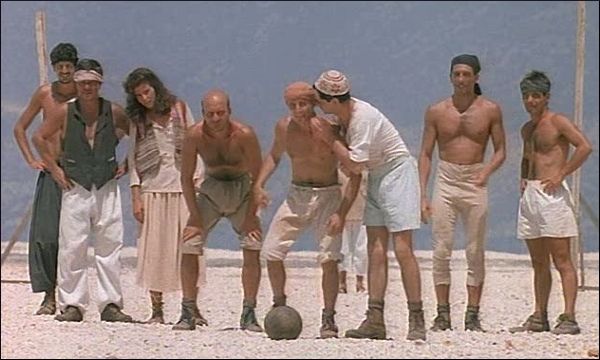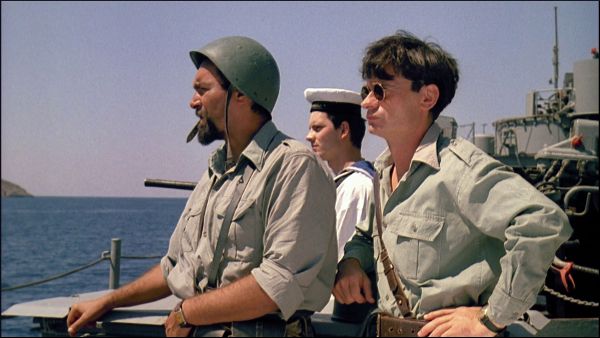Mediterraneo is a 1992 film directed by Gabriele Salvatores, the final part of his loose “trilogy” of movies dedicated to the theme of escape, the other two being Marrakech Express (1989) and Turné (1990). It received good reviews and won several acknowledgements, such as an Academy Award for Best Foreign Language Film and three David di Donatello Awards (the Italian Oscars).
The movie is set during World War II, amidst the evocative backdrop of Castelrosso, a little Greek island in the heart of the Aegean Sea. A troop of Italian soldiers is sent to protect the territory from attack by Allied forces, especially the English. Upon arrival, they find a half-uninhabited town with only women and children, since the men are off fighting in the war. The Italians – played by Diego Abbatantuono, Claudio Bigagli, Gigio Alberti, Giuseppe Cederna, and Claudio Bisio, among others – feel lonely and abandoned at first, since they have to manage for themselves. They are “abbandonati dall'Italia: hanno detto arriangiatevi e noi ci arrangiamo,” as one of the characters says. The term “arrangiarsi” means to survive only through one’s own abilities, to be an artisan of one’s own fate. Italians like to say “l’arte di arrangiarsi.”
"As the title suggests, the movie is a tribute to the Mediterranean sea and its cultures, its peculiar atmosphere, and its traditions."
The soldiers slowly meet the local population: the priest, the beautiful “putta” (prostitute), etc. Every Italian finds something to do: one of them paints and another falls in love. All they know is that “Italiani e Greci: mia faza mia raza: una razza una faccia” (Italians and Greeks: same face, same race). Time progresses and the soldiers have no idea what is happening beyond the island. Meanwhile, the world around them is changing. When an Italian airplane touches down on the so-called “island of oblivion,” the Sicilian pilot informs the soldiers that three years have passed since their arrival in Castelrosso. In the meantime, Mussolini has fallen and “those who were friends are now enemies and viceversa.” According to the pilot, it is the ideal moment to return to Italy, because “many ideals are at play” and one can “make lots of money.”

The soldiers have to choose whether to treat their island experience like a dream and go back to Italy or stay in Greece. As the title suggests, the movie is a tribute to the Mediterranean sea and its cultures, its peculiar atmosphere, and its traditions (during the marriage scene, for example, the spouses have to break a glass for “no one to prevent the happiness of marriage”). But the film is also a sensitive view of the cultural and linguistic differences and similarities between two “races” that share “the same face.”
"Beyond all the important acknowledgements and prizes, Mediterraneo remains one of the most important Italian movies of the last 30 years."
Throughout Mediterraneo, poetic moments coexist with informal language (though never really “low” language). Slang phrases are used, like “fai girare,” which literally means “turn it” but is employed to say “pass it,” referring in this case to a marijuana cigarette. There are also exclamations such as “cazzarola,” used when someone wants to express disappointment without pronouncing a swear word like “cazzo,” which would have been ruder. There is some use of dialect as well, such as the phrase “ti brucj u' peperòn,” which derives from the north of Apulia. It literally translates as “Do you have your ‘pepper’ in flames?,” a linguistic joke and provocation that means: “Are you scared?” Finally, some words are said in Sicilian, like when the pilot exclaims, “Miiinchia tche anni custate accuà?” In regular Italian, that would read, “È da tre anni che siete qui?”(You have been here for three years?). Before flying away, he invites the soldiers to pay him an “unexpected visit” to Palermo: “'Na bbella 'mprovvesata a Palemmo.” The typical hospitality of the South is well-known!
Above all, Mediterraneo is about the search for roots, the exploration of the self, and the meeting with the “other” (different people and cultures). It is also, obviously, a movie about the stupidity of war, which generates hate where there could be friendship. The film is “dedicated to all the people who are running way” to explore, discover, and – why not – find their own way. Beyond all the important acknowledgements and prizes, Mediterraneo remains one of the most important Italian movies of the last 30 years.




